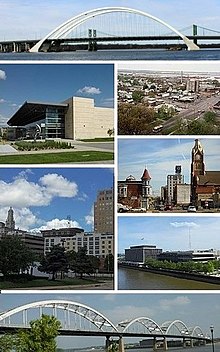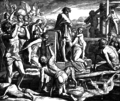Portal:Cities
The Cities Portal

A city is a human settlement of a notable size. The term "city" has different meanings around the world and in some places the settlement can be very small. Even where the term is limited to larger settlements, there is no universally agreed definition of the lower boundary for their size. In a more narrow sense, a city can be defined as a permanent and densely settled place with administratively defined boundaries whose members work primarily on non-agricultural tasks. Cities generally have extensive systems for housing, transportation, sanitation, utilities, land use, production of goods, and communication. Their density facilitates interaction between people, government organizations, and businesses, sometimes benefiting different parties in the process, such as improving the efficiency of goods and service distribution.
Historically, city dwellers have been a small proportion of humanity overall, but following two centuries of unprecedented and rapid urbanization, more than half of the world population now lives in cities, which has had profound consequences for global sustainability. Present-day cities usually form the core of larger metropolitan areas and urban areas—creating numerous commuters traveling toward city centres for employment, entertainment, and education. However, in a world of intensifying globalization, all cities are to varying degrees also connected globally beyond these regions. This increased influence means that cities also have significant influences on global issues, such as sustainable development, climate change, and global health. Because of these major influences on global issues, the international community has prioritized investment in sustainable cities through Sustainable Development Goal 11. Due to the efficiency of transportation and the smaller land consumption, dense cities hold the potential to have a smaller ecological footprint per inhabitant than more sparsely populated areas. Therefore, compact cities are often referred to as a crucial element in fighting climate change. However, this concentration can also have significant negative consequences, such as forming urban heat islands, concentrating pollution, and stressing water supplies and other resources. (Full article...)
Selected city -
Las Vegas (US: /lɑːs ˈveɪɡəs/ lahss VAY-gəss; from Spanish las vegas 'the meadows'), often known simply as Vegas, is the most populous city in the U.S. state of Nevada and the county seat of Clark County. The Las Vegas Valley metropolitan area is the largest within the greater Mojave Desert, and second-largest in the Southwestern United States. Las Vegas is an internationally renowned major resort city, known primarily for its gambling, shopping, fine dining, entertainment, and nightlife, with most venues centered on downtown Las Vegas and more to the Las Vegas Strip just outside city limits. The Las Vegas Valley as a whole serves as the leading financial, commercial, and cultural center for Nevada. According to the United States Census Bureau, the city had 641,903 residents in 2020, with a metropolitan population of 2,227,053, making it the 25th-most populous city in the United States.
The city bills itself as the Entertainment Capital of the World, and is famous for its luxurious and extremely large casino-hotels. With over 2.9 million visitors as of 2019, Las Vegas is the sixth-most visited city in the U.S., after New York City, Miami, Los Angeles, Orlando, and San Francisco. It is a top-three destination in the U.S. for business conventions and a global leader in the hospitality industry, claiming more AAA Five Diamond hotels than any other city in the world. Las Vegas annually ranks as one of the world's most visited tourist destinations. The city's tolerance for numerous forms of adult entertainment had earned it the nickname "Sin City", and has made Las Vegas a popular setting for literature, films, television programs, and music videos. (Full article...)Did you know -
- ... that Julie Mehretu's Mural, installed at 200 West Street in New York City, was painted using 215 different colors?
- ... that early in her career, Maria Calegari danced principal roles in every ballet performed one weekend by the New York City Ballet?
- ... that New York City's largest office building is owned by an Alabama pension fund?
- ... that in 1952 meteorologist Harry Volkman delivered the first on-air tornado warning on Oklahoma City's WKY-TV, in defiance of a federal ban on the practice?
- ... that New York City's James B. Duke House was modeled after a French chateau and designed by an architect who did not have a formal architectural education?
- ... that the Neil Simon Theatre, a New York City landmark, was the first Broadway theater renamed after a living playwright?
Related portals
Related WikiProjects
Shanghai is one of the four direct-administered municipalities of China. The city is located on the southern estuary of the Yangtze River, with the Huangpu River flowing through it. The population of the city proper is the third largest in the world, with around 29.2 million inhabitants in 2023, while the urban area is the most populous in China, with 39.3 million residents. As of 2018, the Greater Shanghai metropolitan area was estimated to produce a gross metropolitan product (nominal) of nearly 9.1 trillion RMB ($1.33 trillion). Shanghai is one of the world's major centers for finance, business and economics, research, science and technology, manufacturing, transportation, tourism, and culture. The Port of Shanghai is the world's busiest container port.
Originally a fishing village and market town, Shanghai grew in importance in the 19th century due to both domestic and foreign trade and its favorable port location. The city was one of five treaty ports forced to open to European trade after the First Opium War which ceded Hong Kong to the United Kingdom, following the Second Battle of Chuenpi in 1841, more than 60 km (37 mi) east of the Portuguese colony of Macau that was also controlled by Portugal following the Luso-Chinese agreement of 1554. The Shanghai International Settlement and the French Concession were subsequently established. The city then flourished, becoming a primary commercial and financial hub of Asia in the 1930s. During the Second Sino-Japanese War, the city was the site of the major Battle of Shanghai. After the war, the Chinese Civil War soon resumed between the Kuomintang (KMT) and the Chinese Communist Party (CCP), with the latter eventually taking over the city and most of the mainland. From the 1950s to the 1970s, trade was mostly limited to other socialist countries in the Eastern Bloc, causing the city's global influence to decline during the Cold War. (Full article...)Selected article -
General images -
Topics
List articles
Subcategories
Associated Wikimedia
The following Wikimedia Foundation sister projects provide more on this subject:
-
Commons
Free media repository -
Wikibooks
Free textbooks and manuals -
Wikidata
Free knowledge base -
Wikinews
Free-content news -
Wikiquote
Collection of quotations -
Wikisource
Free-content library -
Wikiversity
Free learning tools -
Wiktionary
Dictionary and thesaurus










































